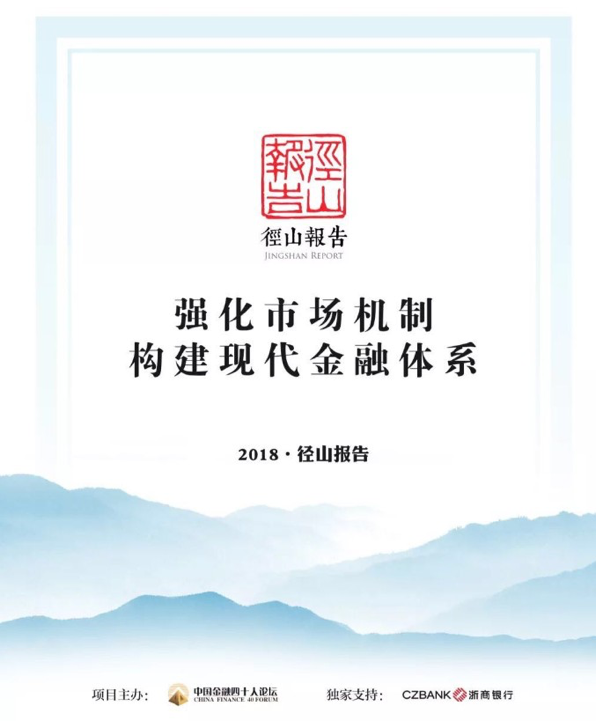
On September 15, 2018, China Finance 40 Forum (CF40) released the 2018 Jingshan Report in Hangzhou, Zhejiang Province. The theme of the report is Strengthening Market Mechanisms and Promoting a Modern Financial System in China.

The report is the second installment of the Jingshan Report series. Following last year’s report on China’s financial opening, this year’s report comprehensively analyzes the financial system in China in a bid to formulate policy proposals to promote the modernization of China’s financial system - part of the government’s efforts to establish a modern economic system.
The research team consists of officials from the People's Bank of China (PBC), economists from China’s renowned financial institutions and leading experts from academia, including Huang Yiping, Chairman of CF40 Academic Committee and Deputy Dean of National School of Development at Peking University; Yin Jianfeng, CF40 Member Institute Representative and chief economist of China Zheshang Bank; Zhang Bin, CF40 senior fellow; Xu Zhong, Director-General of the PBC's Research Bureau; Ji Zhihong, CF40 Member and Director-General of PBC’s Financial Market Department; and Hong Lei, CF40 Council Member and Chairman of Asset Management Association of China (AMAC). All members participated in this research in their personal capacities.
The report points out three major problems with China’s financial system. First, the system cannot effectively support the development of the real economy. Second, the boundary between the government and the market is blurred. Third, supervision of financial risks is inefficient.
Specifically, the report proposes the following policy recommendations on how to establish a modern financial system that operates on market principles and effectively adapts to changes:
-Let the market play the decisive role in allocating financial resources. Market entry and exit rules should be established for financial institutions. Distortions in fund pricing and investor behavior should be reduced and eventually eliminated. The role of the government should be limited to macro adjustment, maintaining market order and stability and correcting market failures.
-Further promote the market-based reform of commercial banks, improving the corporate governance structure and the capabilities of asset pricing, push forward the marketization of lending and borrowing interest rates, and establish deposit insurance systems and bank resolution mechanisms.
-Optimize the functioning of capital markets by enforcing fiduciary duties of market players.
-Formulate financial policies that can effectively support innovation and industrial upgrading. Experiment with sandbox regulation and achieve a balance between innovation and risk control.
-Financial regulation should resolutely safeguard the bottom line of forestalling systemic financial risks.
-The monetary policy framework should shift from a quantity-based mode to a price-based mode.
-Perfect the legal system for a modern financial system, establish a unified legal system and amend outdated laws. Legislation should be forward-looking, and enforcement needs to be strengthened.
Historically, financial crises in western countries were to some degree associated with “over-liberalization” of the market, but for China’s financial system, the critical fact is not “excessive marketization,” but “inadequate marketization”, Huang made the remarks at the report release.
CF40 Secretary-General Wang Haiming chaired the conference.